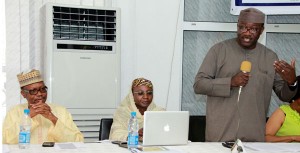
L-R: Chairman, Organising Committee, Dr. Kole Shettima; former Head of Programs, Centre for Democracy and Development, Hajiya Amina Salihu; and Chairman of the Occasion and Governor of Ekiti State, Dr Kayode Fayemi, during the 50th Africa Day Celebration and 4th Memorial of Tajudeen Abdul-Raheem, in Abuja.
Ekiti State Governor, Dr Kayode Fayemi has identified poor leadership and weak institutions in African countries as major reasons why democracy has not thrived in the continent in recent times.
Speaking in Abuja at the 2013 Africa Day celebration, tagged “Celebrating the 50th Africa Day and Reflections on the Memory of Tajudeen AbdulRaheem”, the Governor noted that Africa’s leadership challenges still remained; saying that the situation as described by American President, Barrak Obama that many African nations lack strong institutions and are yet ruled by strong men had not changed.
Dr. Fayemi stated that the clear implication of sustaining strong leaders is the weakening and sometimes the outright abortion of “other institutional possibilities”; adding that institutional weaknesses stem largely from a lack of leadership. He asserted that democracy, civil liberties, a free press and an independent judiciary are subjugated by the sovereign absolutism of authoritarian leaders.
“This trend is intensified by the dynamics of Post-September 11 American statecraft which has put American foreign policy on a “War on Terror” footing. In search of proxies with which to wage wars against “terrorist movements” in Africa, the US is reviving cold war era partnerships with dictatorial regimes and undermining legitimate local struggles for group rights by dubbing them “terrorists.”
Not surprisingly, some African regimes see the war on terror as an opportunity to abbreviate civil liberties, victimize legitimate opposition movements, and deploy repressive authoritarian tactics against opponents. Democracy in Africa loses”, Fayemi said.
The Governor stressed that the transfer of power from strong men to the people and the strengthening of democracy-enabling institutions have to be seen as a critical next phase of the Pan-Africanism project; adding that African unity cannot be conceived solely as a top-down enterprise orchestrated by the coming together of national leaders but as a convergence of civil societies of the various countries.
On the unity of Africa, Fayemi noted that for Pan-Africanism to resurface in the African and global consciousness in the 21st century, there is need for the emergence of new leadership and advocacy on intellectual and political fronts to drive the institutional innovation required for the accelerated journey towards African unity.
His words: “Perhaps the most obvious challenge to the ideal of African unity today is the lack of institutional capacity to facilitate its realization. The Organization for African Unity was founded with this goal in mind but eventually settled for a less radical, more conservative posture of managing the continent’s colonially-instituted boundaries and rallying African peoples against minority settler regimes in Southern Africa”.
While lamenting the entrenchment of an image of aid dependence on Africa portraying it as a place of dire need, poverty and war, perennially requiring the benevolence of outsiders for survival, the Governor described the development as a “terrible reversal” given the perspective of “those lofty pan-African visions of yore”.
He explained that this reversal is a result of the economic mismanagement and monumental corruption that has reduced too many African states to recipients of charity and such dependency undermines the sovereignty of these nations.
Fayemi however concluded that for the continent to return to its vision of pan-Africanism, the Pan African movement must belong to the people and in particular, engage the dreams and visions of Africa’s teeming young population who will carry the torch of Pan Africanism forward.
Last modified: May 25, 2013
